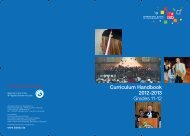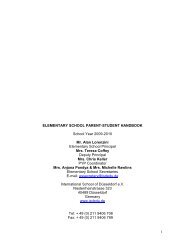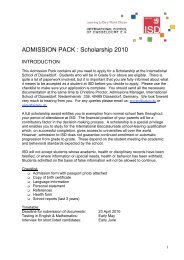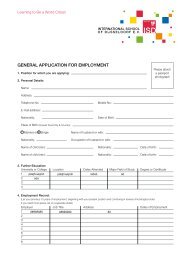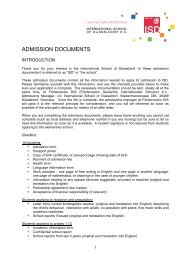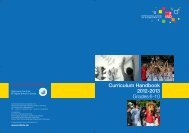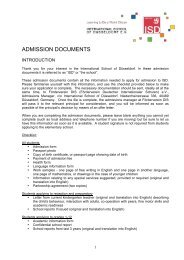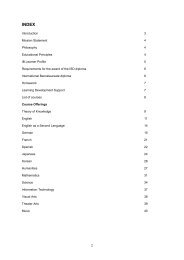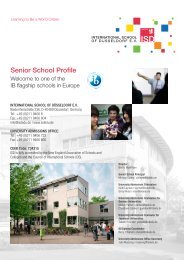SENIOR SCHOOL STUDENT - PARENT HANDBOOK
SENIOR SCHOOL STUDENT - PARENT HANDBOOK
SENIOR SCHOOL STUDENT - PARENT HANDBOOK
Create successful ePaper yourself
Turn your PDF publications into a flip-book with our unique Google optimized e-Paper software.
o understand that observed cases of academic dishonesty should be<br />
reported<br />
o do not take ideas or concepts from others and present them as their own<br />
o do not put classmates in a difficult situation by asking to copy their work<br />
o do not allow others to copy their work<br />
o acknowledge academic difficulties and discuss them openly to find<br />
solutions<br />
o accept correction or constructive criticism, recognizing that it helps them to<br />
learn<br />
o accept responsibility for their own actions and words.<br />
Teachers who follow the principles of academic integrity:<br />
o model good practice in their own work<br />
o answer questions truthfully and are willing to admit mistakes<br />
o understand and uphold the school’s standards<br />
o establish clear academic guidelines and standards in the classroom and<br />
apply them consistently<br />
o provide opportunities for all students to demonstrate academic success<br />
o give students clear guidance to avoid plagiarism<br />
o encourage students to take responsibility for their own work<br />
o apply assessment criteria consistently and fairly<br />
o design assessment tasks which are not open to cheating or plagiarism.<br />
Cheating/plagiarism.<br />
Many cases of academic dishonesty arise from unique circumstances and<br />
will therefore be treated on a case-by-case basis, but the procedure below<br />
should guide responses to reported incidents of academic dishonesty.<br />
This procedure assumes that students have been given clear guidelines<br />
for each assignment, especially with respect to appropriate use of sources<br />
and what is considered acceptable help from other people.<br />
For extended assignments, teachers should establish a clear checkpoint<br />
process which can confirm the provenance of the students’ work e.g.<br />
submission of outline, first draft, copies of notes, mind maps etc.<br />
If a student is suspected of academic dishonesty (cheating, plagiarism,<br />
collusion, any other attempt to deceive the teacher about the source of the<br />
work) the teacher should discuss the matter with the student to discover if<br />
the suspected dishonesty was intentional rather than the result of other<br />
factors such as ignorance, carelessness, misunderstanding or cultural<br />
differences<br />
First occasion:<br />
a. If the infraction was unintentional, the teacher should advise the<br />
student on how to avoid such situations in the future, and inform the<br />
13



